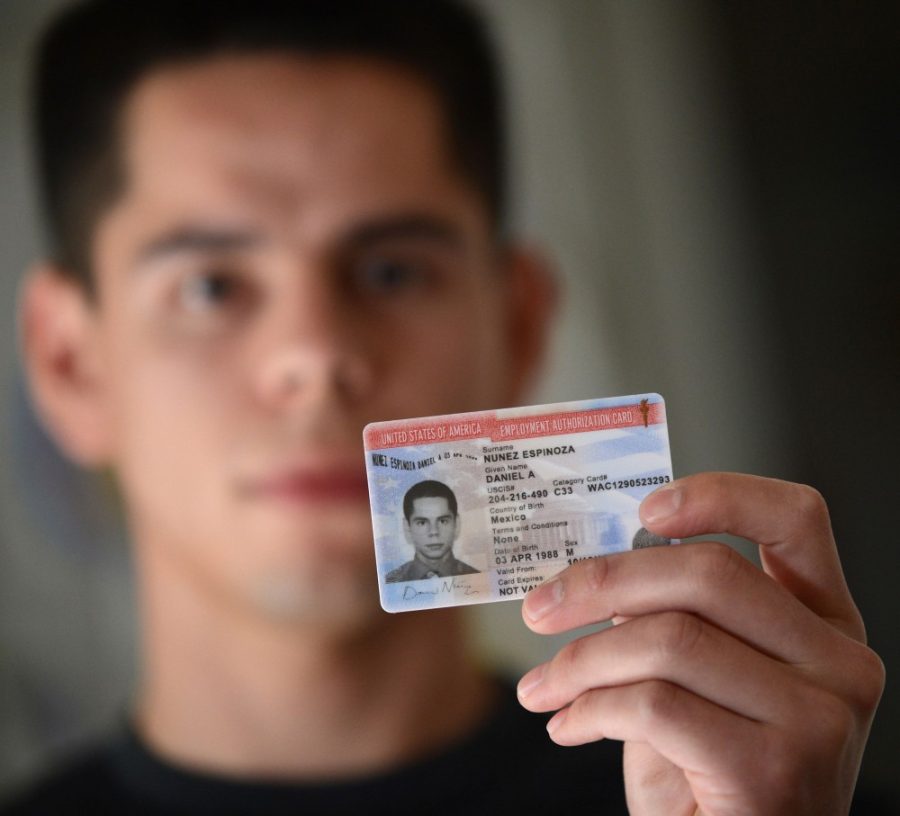SAN JOSE, Calif. — The force field protecting Jirayut Latthivongskorn comes from a glossy, federally issued work permit that wards off deportation and lets him get a job, overcoming the legal barriers that have long clouded his ambitions and shadowed his life.
Mailed to homes in fast-growing numbers, the cards are changing the lives of about 300,000 young immigrants, a quarter of them from California, who took a leap of faith this fall by revealing their presence to the U.S. government.
Latthivongskorn’s plastic card, with its 2014 expiration date etched between his fingerprint and photograph, symbolizes what he calls his “two-year lease on life in America” — permission to live and work under President Obama’s reprieve for young illegal immigrants brought to the country as children.
A rapidly changing post-election political landscape is bolstering the hopes of the nation’s more than 1 million illegal immigrant youths. They have a president who says he has their backs and a chastened Republican Party openly reconsidering its harsh opposition to giving them a break.
Emerging everywhere, in cities and affluent suburbs, are people like Latthivongskorn, a UC Berkeley graduate who dreams of becoming a doctor, and Daniel Nunez, a San Jose leaf blower who hopes for a life in the corporate world.
For years, the young immigrants have tiptoed through their lives, trying to avoid risks that would expose their illegal status to employers, police officers, even friends.
For those who obtain work permits, the labels “illegal” and “undocumented” no longer apply. And their future has never seemed brighter.
Here are their stories:
Daniel Nunez
Three years ago, Nunez applied at the GooglePlex to wash dishes for the caterer that feeds the Mountain View Internet giant’s army of tech workers.
It was hardly the community college student’s dream job, but it seemed more exciting than blowing leaves off the grounds of Silicon Valley industrial parks, which he has been doing since his teens.
The job offer appeared imminent until he reached a familiar barrier: the background check.
“I just got scared and told them I wouldn’t be able to accept it.”
Then, over the summer, the Obama administration announced it would grant work permits and not deport illegal immigrants 30 or younger who were brought to the country as children and meet basic requirements, such as graduating from high school.
The two-year, renewable permits don’t confer citizenship, but they were the opportunity of a lifetime for people like Nunez, among the first in the Bay Area to apply and be accepted.
Now, he is looking for a job and studying for his driver’s license exam, because California is among several states that let the protected immigrants drive.
Nunez’s mother had brought him illegally across the U.S.-Mexico border when he was a toddler.
Growing up, he hung out with fellow video game-playing geeks at his San Jose school, got decent grades and stayed out of trouble.
“It’s not like it’s life or death, but sometimes I feel like it’s life or death,” Nunez said. “If I do something wrong, the life that I know could be gone.”
Jirayut Latthivongskorn
The jazz band was playing when Latthivongskorn walked into UC Berkeley’s Golden Bear Center this month. Undergraduates and professors he knew mingled with wealthy donors sipping red wine and nibbling appetizers.
The party celebrated the opening of the Robert Haas Jr. Dreamers Resource Center, a tiny drop-in office for the 195 UC Berkeley students who are in the country illegally.
“In some ways, since I came to Berkeley, the single most impressive undergraduates I’ve met have been undocumented,” Birgeneau said before his speech.
All of them “earned admission against enormous odds,” he said.
He was speaking of people such as Latthivongskorn, who maintained a 3.7 grade-point average and held a job at a Thai eatery near campus.
He was 9 and thought he was on vacation when he landed with his sister and brother in California in 1999. They were here to stay, his parents later revealed.
He graduated from UC Berkeley in May, after majoring in molecular and cell biology, and is applying to medical schools. He frequently returns to campus as a co-founder of Pre-Health Dreamers, a burgeoning national network to help promising illegal immigrant students pursue medical careers.
“I don’t like for people to be discouraged from what they want to do because of these barriers,” he said.









